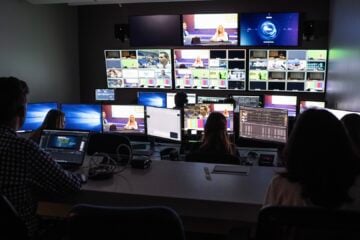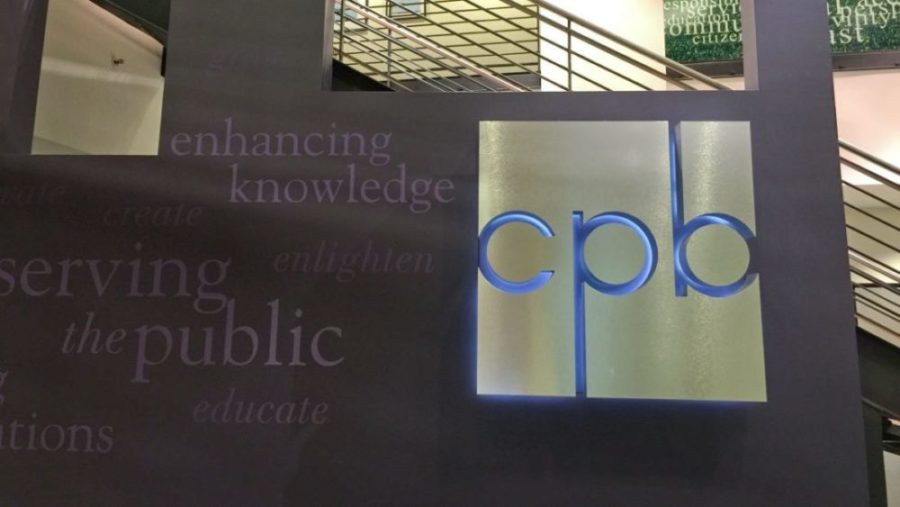One Small Step initiative looks to extend network of participating stations
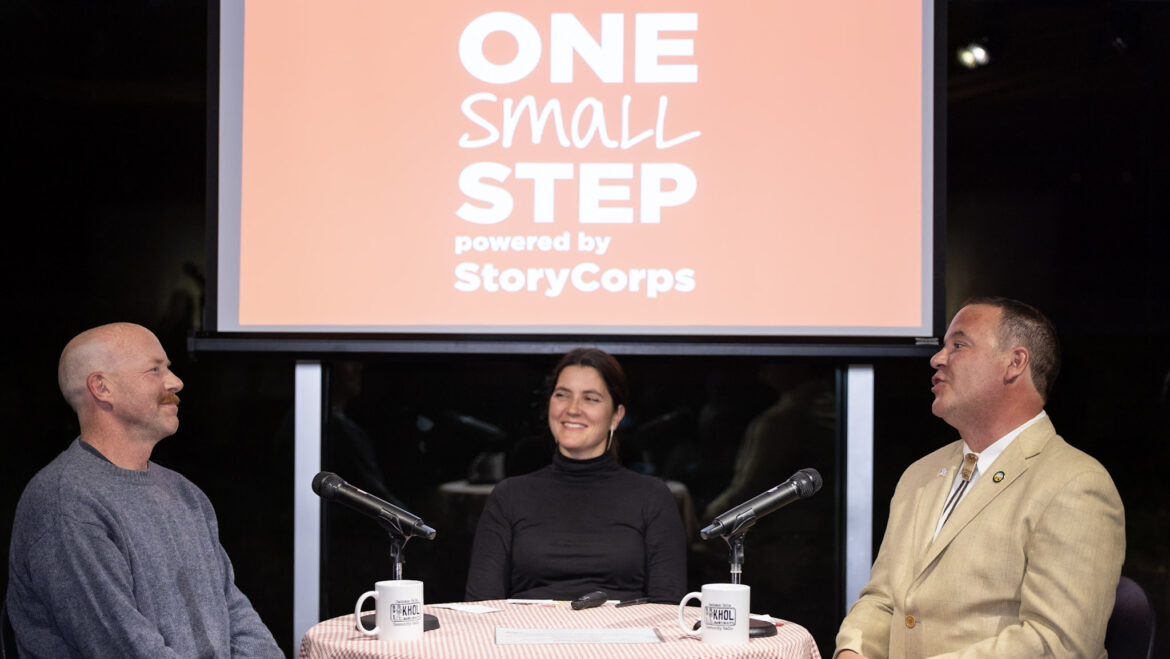
StoryCorps
During a listening event hosted by KHOL in Jackson, Wyo., former Mayor Pete Muldoon, left, and then-city Councilmember Jim Rooks, right, participate in a 2023 conversation facilitated by KHOL’s Alyson Spery.
In an expansion of StoryCorps’ One Small Step initiative, six public radio stations — and potentially more to come — will simultaneously host conversations that aim to bridge divisions between pairs of people with opposing political identities.
CPB annually funds a cohort of new stations to act as “hubs” for One Small Step for one year. In addition to the newest cohort of four hub stations announced Thursday, StoryCorps is recruiting alumni of the program to continue their community-based work. At least two stations from the last cohort of CPB grantees have already signed on as alumni.
The CPB grants primarily support stations’ costs of staffing, equipment purchases and outreach events for One Small Step. About 20% of CPB’s annual grant supports the training that StoryCorps provides to hub stations, according to Jonathan Webster, national managing director of One Small Step.
The latest CPB grant provides $500,000 for the newest cohort of stations: KGNU in Boulder, Colo.; Tri States Public Radio in Macomb, Ill.; WKU Public Radio in Bowling Green, Ky.; and WYSO in Yellow Springs, Ohio.
In an interview with Current, Webster and StoryCorps Founder and CEO Dave Isay also described their efforts to build a network of One Small Step stations by providing resources and tools to alumni stations to continue facilitating One Small Step conversations and programming.
WERU Community Radio in East Orland, Maine, and Central Florida Public Media in Orlando, Fla., will extend their work with One Small Step, even though their CPB grants just ended.
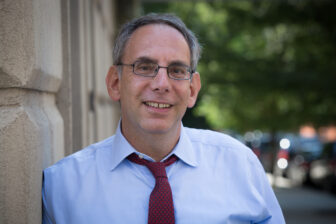
Isay described the dream of the program as trying to “convince the country it’s our patriotic duty to see the humanity and people with whom we disagree.”
“Democracy can’t survive in a swamp of mutual contempt,” he said. “We’ve got to figure this out, or else it’s not going to end well. So it’s kind of as simple as that.”
Efforts to extend station participation follow the 2024 launch of One Small Step Connect, a digital platform for conversations between people with different political views to discover what they have in common.
Ongoing research at Yale University continues to show that One Small Step conversations build empathy between participants and improve their views of their conversation partners’ larger social group, Isay said.
That’s unusual in research around contact theory, the hypothesis that positive interactions with people who have different beliefs and identities can improve intergroup relationships, Isay said. Typically, research finds the improvements in empathy don’t extend to the larger group beyond the two individuals in contact.
Findings from the Yale study make One Small Step conversations “one of the more successful, if not the most successful, examples of a methodology around contact theory,” he added.
CPB is a longtime, steadfast supporter of Isay’s work to bring people together for conversations that enrich civic dialogue. With proposed rescissions to its federal appropriations for 2026 and 2027 pending in Congress, Isay acknowledged he doesn’t know how those cuts might impact One Small Step station hubs.
Still, StoryCorps is “going to figure out a way to keep doing the work — no matter what happens,” he said.
Learning active listening skills
With the new cohort of stations announced last week, One Small Step has provided training and production support for One Small Step to 34 stations in 31 states.
Since 2019, One Small Step stations have hosted over 800 conversations, Webster said.
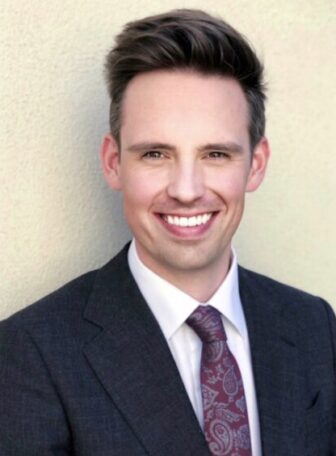
Under the CPB grant program, stations must host 25 One Small Step conversations with community members, produce audio segments from the conversations and host community outreach events. Events vary by station but often happen at high schools, universities, churches or civic organizations, Webster said.
Each year, One Small Step and the new hub stations work through logistics and planning for about a month before formal training starts. The training phase takes another few weeks and involves two staff members from each station, who learn how to facilitate conversations that involve difficult subjects.
Facilitators don’t know what’s going to happen in any conversation, “so it’s helpful to have skills around encouraging active listening,” Webster said. “It’s also important for those … facilitators to help enforce conversation agreements — the kinds of things that people agree to when they come in — that help them have constructive, respectful conversations.”
Stations that continue with One Small Step after their CPB grant ends don’t receive direct financial support. By transitioning to alumni status, they remain connected to the network of active stations, share information related to best practices and retain access to the proprietary digital tools created for the project.
The tools perform such tasks as signing up participants, matching participants and scheduling conversations, according to Webster. StoryCorps’ technology also facilitates conversations in-person and virtually. In addition, the One Small Step team supports alumni stations in their community outreach, fundraising and production of radio content.
Webster is working to recruit more stations to participate as alumni. Several previous participants have continued to facilitate One Small Step conversations without StoryCorps resources after their grants ended, he said.
One ‘way out’ of polarization
The One Small Step Connect program for virtual meet-ups has facilitated thousands of conversations since it launched last year, Isay said. Demand for the online conversations ebbs and flows, but the need for it is always there.
“People just don’t know what to do,” Isay said. “They’re scared about what’s happening in the country, the polarization, and looking for a way out. And what we’re trying to do slowly, methodically and carefully, is get the word out that there is this thing called One Small Step that you can do.”
With research continuing to validate the efficacy of One Small Step’s approach, StoryCorps is looking at how to bring people together across other non-political divides, especially on college campuses where students aren’t always interested in identifying themselves as liberal or conservative, Webster said. He and Isay are also considering how to connect One Small Step to the celebrations of the 250th anniversary of the signing of the Declaration of Independence next year.
Continuing the program is critical, Isay said. Though it won’t solve everything, it is truly “one small step” in the right direction.
”We’re not the answer to everything by any means,” he added. “…But we’ve got to figure out ways back from the ledge, or we’re in deep trouble as a country.”



